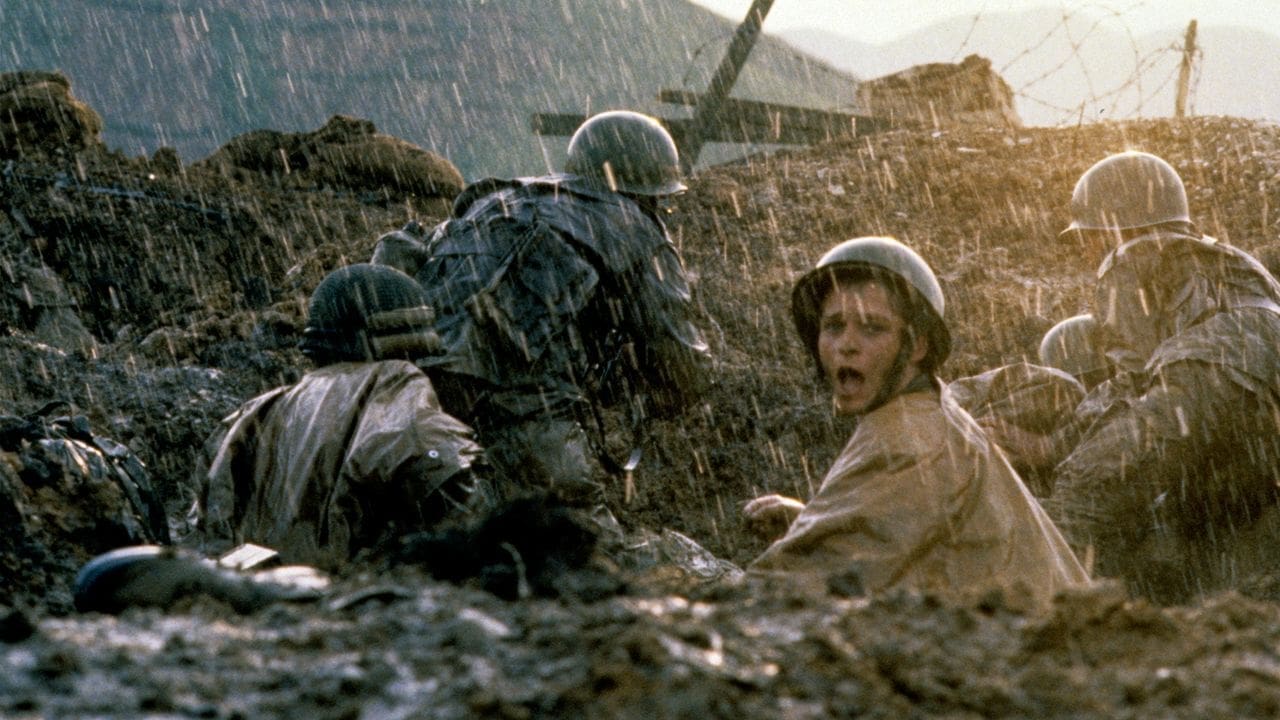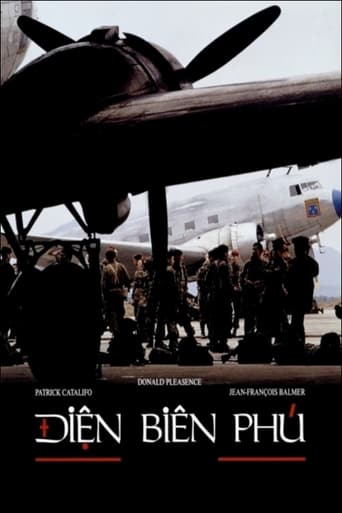SmugKitZine
Tied for the best movie I have ever seen
StyleSk8r
At first rather annoying in its heavy emphasis on reenactments, this movie ultimately proves fascinating, simply because the complicated, highly dramatic tale it tells still almost defies belief.
Madilyn
Not sure how, but this is easily one of the best movies all summer. Multiple levels of funny, never takes itself seriously, super colorful, and creative.
Jerrie
It's a good bad... and worth a popcorn matinée. While it's easy to lament what could have been...
gordonl56
DIEN BIEN PHU 1992This is French director, Pierre Schoendorffer's third film on various battles in Vietnam. Director Schendorffer was an army cameraman at the actual battle of Dien Bien Phu.The French had been battling the Vietminh since they reclaimed Indochina after World War Two. The Communist crowd were not happy with this idea, and started an ever-growing campaign against the French. The French fought back not realizing the drain on men and material that a war weakened France could tolerate. The war raged on till 1954 and the Viet victory at the battle of Diem Bien Phu.The film follows several officers of the French Foreign Legion Parachute Regiment. We follow their exploits during the final month of the battle. The French Government is not willing to expend any more resources. Several thousand troops are soon trapped after the Reds overrun the surrounding hills. Air support can only do so much and the French positions fall one after the other.There is also a minor side plot with an American newspaper man doing a story on the battle. The man, Donald Pleasance, seems to spend most of his time drinking and checking out the local gambling establishments. Said establishments are doing a box office business with wagers on when the French garrison will fall.The look of the film is quite good with excellent use of period detail and weapons involved. The pace of the film though is just too slow, the jumping back and forth between the battle and back area of Hanoi, just does not work.I wanted very much to like this film, as I was impressed with the director's other two Vietnam films, THE 317th PLATOON and THE ANDERSON PLATOON. This one however just does not make the cut.
Theo Robertson
The battle Of Dien Bien Phu is one of these battles that became quickly forgotten in military history . It is a battle that should never be forgotten . In an attempt to deal a decisive blow to the nationalist Viet Minh during the French Indo-China war the French forces built a base deep in the hills of Indo-China in 1954 hoping to cut off the VM supply lines and to use the base as an anvil where the Viet Minh would be hammered in to submission . With hindsight the plan was doomed to failure since the French were conducting a not altogether unsuccessful strategy of mobile warfare against the nationalists up till this point . The French also underestimated the Vietnamese ability to carry heavy artillery including anti aircraft guns in to the war zone which considering the French base was totally reliant on air supply led to the disaster that saw 2,500 French forces killed in a six week battle , another 11,000 captured of which nearly 80% died in Viet Minh captivity and led to France losing the war , the first time a major industrial power lost to a third world nation and set in motion the build up to the cold war confrontation that saw 58,000 Americans and 2,000,000 Vietnamese die in the better known conflict that started 10 years laterThe French Indo-Chinese conflict isn't one that is often seen on celluloid . I remember in the mid 1980s how popular the American experience Vietnam was in popular Western culture with countless books being published and of course the big Hollywood blockbusters . One of the problems with this is summed up in an interview with the writer/director of DIEN BIEN PHU Piere Schoendoerffer who stated that there that he had a problem getting the budget to portray the battle and you can see his point since French cinema is depending on how you look at it famous or infamous at making small budget existentialist movies rather than Hollywood style blockbusters Make no mistake this is big budget , epic cinema rarely seen in Europe and many of the battle scenes resemble those seen in the Du Long bridge sequence of APOCALYPSE NOW . The director spent the real life battle as a cameraman so he knows what the conditions were like and it shows . For anyone who has visited the Asian continent during monsoon season they'll realise rain doesn't exist in the Western hemisphere only drizzle and Schoendoerffer gets that right . I have no experience of war in general and the battle of Dien Bien in particular but have no reason to doubt that the battle here is anything less than 100 per cent accurate as each hill is over run and the French defenders realise that the outcome is historical defeat There are a couple of points that do irritate . One is the presence of Donald Pleasence who hasn't a lot to do and his miscasting seems to be included to sell the film to an English speaking market . The second is a sequence where the story cuts back to Hanoi ( The fractured storyline keeps cutting back to Dien Bien Phu and Hanoi ) where a concert is taking place and a female violin player plays a solo as the picture cross fades to the night time battlefield which brings an art-house scene where the film certainly didn't require it These are minor flaws in a film that requires to be much better known and it's somewhat sad that so few people have commentated on DIEN BIEN PHU in the English speaking pages of this website . If you like watching war films there's few films showing the horrors of war better . Put this in perspective in ten years of war in Afghanistan it took ten years for NATO to lose 2,000 troops . At Dien Bien Phu the French lost that amount in six weeks
r-c-s
Well, this movie is basically a fictionalized documentary about the fall of Dien Bien Phu. It goes 5/10 because photography is good enough and i could watch it until the end. There is nothing particular to say about acting. There are a few subplots, but they all boil down to how war affects people. Character development (if any) isn't noticeable. There is Donald Pleasence, but i wonder why...perhaps they needed some name-recognition tied to an obscure french movie. He plays a famed reported, but basically goes around exchanging futile chatter and riddles with basically sketched characters. It goes past 2h, so the movie drags its feet, for the kind of movie it is. I found it easily watchable enough, but i am NOT going to watch this twice. Good residual documentary value.
minutte
This movie needs some background knowledge of the colonial European history, mainly the french one, to be fully appreciated. The director, Schoendorffer, was an army cameraman sent to Dien Bien Phu, and one of the characters, Howard R. Simpson, was an US correspondent in Indochina and wrote an interesting book: "Dien Bien Phu: The Epic Battle America Forgot", worth to read.Schoendorffer was prisoner after the battle and sent to Vietminh concentration camps where he survived after another cameraman from the Red Army meet him.He is the narrator's voice.What caught first my attention in this movie is that if you were serving in the army, it puts you right from the beginning in the atmosphere of a regular soldier spending time in maneuver and camp exercises.Guys on the field, some artillery, some air force, and some shouting in the background.Nothing spectacular, absolutely no epic, just like you're back in the military.At a certain point mortars fire is increasing, and shouting escalating, and that's the start of the battle.And you are in the mud, bleeding bodies and dead around you.It's just slightly over the level of raw documentary. So it's easy to feel close to the guys on the battlefield.Some Thai volunteers are shown, alongside Vietnamese, African troops, paratroopers, legionnaire, regular infantry, etc.Quite realistic photography and not like "in the movies". The Vietminh artillery made landing impossible, the place was isolated and only parachutist support is possible. Hills all around, it's often cloudy and Vietminh troops keep until the end hidden by their camouflage strategy.Nguyen Giap opted for an intense, moving and steady mortar bombing, backed by supplies and troops supported by China.Instead of a fierce battle were the tactics of the french general could had been superior.But that's no the point of the movie. Because, scenes at the ground, depicting the evolution and worsening of the battle, are alternated with the situation as seen from Hanoï. In this part, there's a reconstitution of the colonial french time, the Vietnamese, the Europeans, the colorful variety of uniforms. A violinist comes to the city for a gala concert.Life keeps going on at the same pace, while in the meantime soldiers are being sacrificed in Dien Bien Phu.A symbolic way to show how the politics were already wanting to leave Indochina, but at the same time they wanted a nice exit, with military bravery and honors, a la legionnaire. The nice violinist lady has a relative who is captain and they meet with other soldiers at a bar where some talks give an insight on the situation and the meaning of the battle, which appears more and more like a strategical non-sense.Soldiers are shown doing their job and there's nothing theatrical, just few quaint words about military duty's spirit and a somewhat "old school" sense of bravery.But in the 50's that was still very alive in the french military.So it stays in context. Talks between soldiers are fully understood to people familiar with french army mind and traditions.Otherwise it works like an insight.The movie is somewhat biased as an ode to Indochina and its people itself, which is a point of view debatable.Ho Chi Minh was, despite being communist, an independents and French were foreign rulers.Yet, that point of view and the kind of relation of Vietnam to french culture is represented by the boss of the local paper in Hanoï.All in all, an excellent movie, even if not accessible to a non-informed public.

